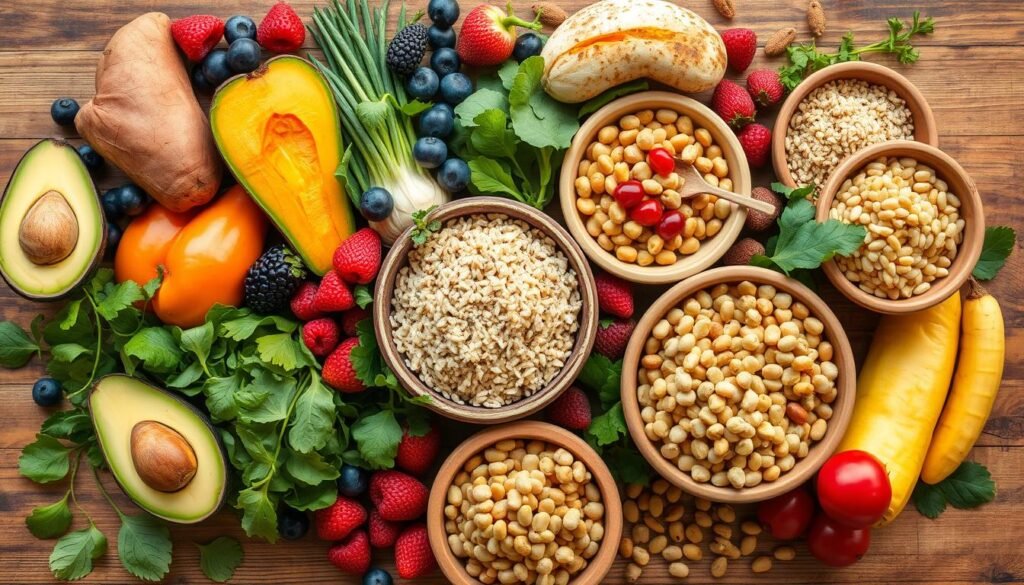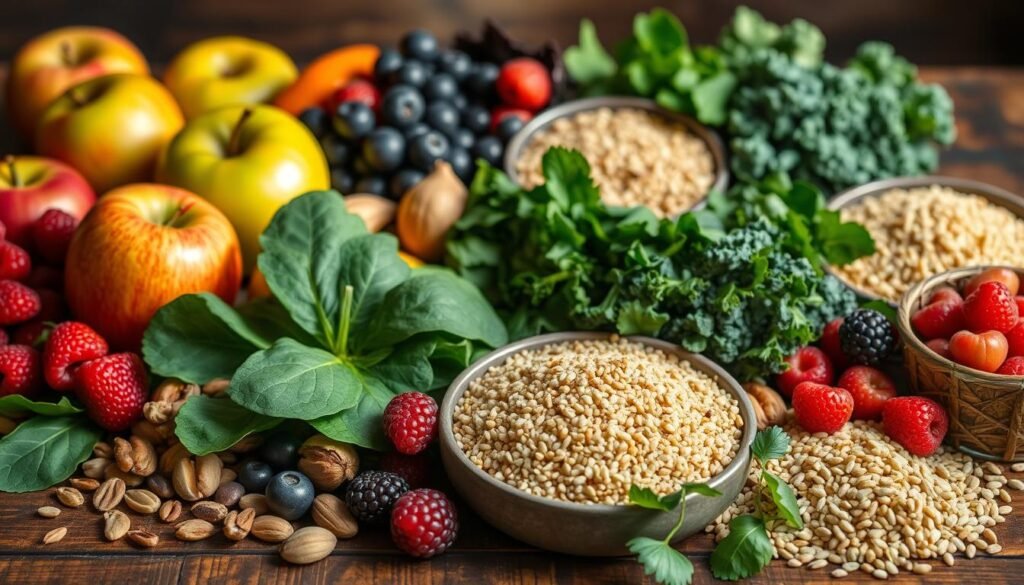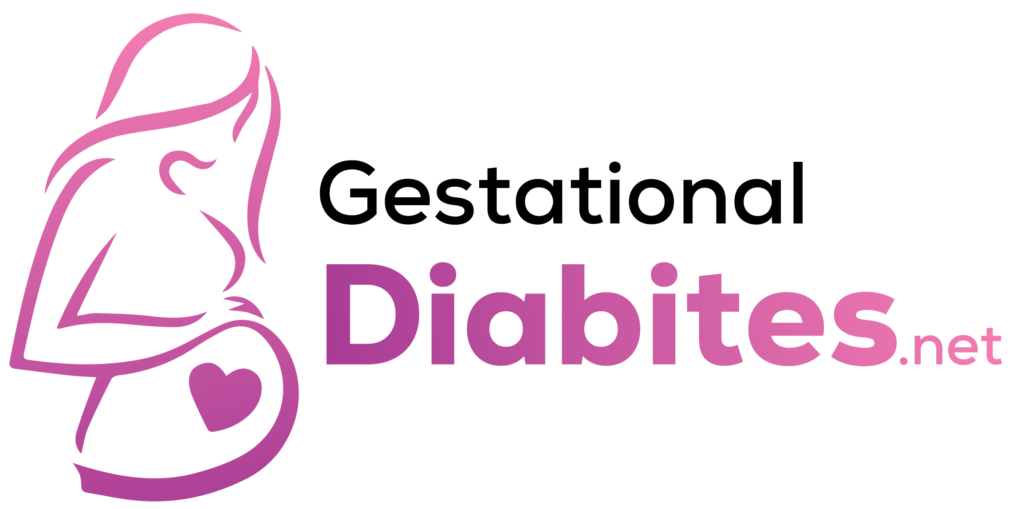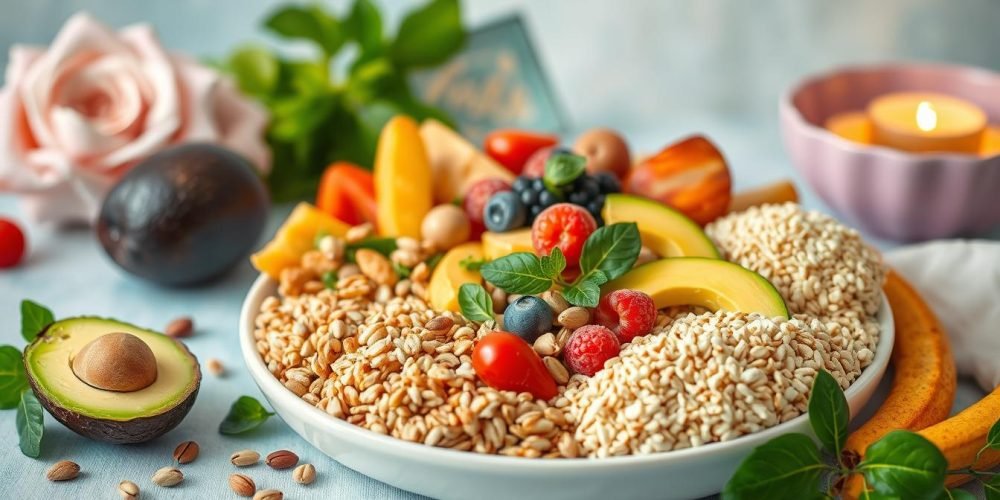Why Is Fiber Good For Pregnancy ? A high-fiber diet is key for pregnant women. It helps keep a healthy weight and lowers the risk of gestational diabetes. A balanced diet with plenty of fiber is important for regular bowel movements, which is crucial for expectant mothers.
Research shows that a high-fiber diet greatly benefits pregnant women’s health. It’s a vital part of prenatal care.
Key Takeaways
- A high-fiber diet helps maintain a healthy weight during pregnancy
- Fiber reduces the risk of gestational diabetes
- Regular bowel movements are promoted through a high-fiber diet
- Fiber is essential for overall health during pregnancy
- A balanced diet rich in fiber supports prenatal care
- Why is fiber good for pregnancy is a common question among expectant mothers, and the answer lies in its numerous fiber benefits
- Understanding the importance of fiber benefits can help pregnant women make informed decisions about their diet
Understanding Fiber During Pregnancy
Fiber is key for a healthy digestive system during pregnancy. It helps prevent constipation, a common problem. Eating enough fiber keeps bowel movements regular and stops hemorrhoids.
There are two types of dietary fiber: soluble and insoluble. Soluble fiber lowers cholesterol by dissolving in water. Insoluble fiber, on the other hand, helps with regular bowel movements and doesn’t dissolve in water.
Types of Dietary Fiber
- Soluble fiber: found in foods such as oats, barley, and fruits
- Insoluble fiber: found in foods such as whole wheat, vegetables, and nuts
Recommended Daily Fiber Intake for Pregnant Women
Pregnant women need 25-30 grams of fiber daily. You can get this from whole foods like fruits, vegetables, whole grains, and legumes.
How Pregnancy Affects Fiber Needs
Pregnancy changes fiber needs due to hormones and blood volume increase. These changes can cause constipation. A diet rich in whole foods helps meet fiber needs and supports a healthy pregnancy.
Why Is Fiber Good For Pregnancy: Key Benefits Explained
Fiber is key for a healthy pregnancy. It helps in many ways. It can lower the chance of gestational diabetes, keep bowel movements regular, and help with weight gain.
These pregnancy benefits are vital for a smooth pregnancy.
Some main benefits of fiber during pregnancy are:
- Reducing the risk of gestational diabetes
- Promoting regular bowel movements
- Supporting healthy weight gain
Eating foods high in fiber can greatly improve your health during pregnancy. With enough fiber benefits and pregnancy benefits, you can have a healthy and joyful pregnancy.
Preventing Pregnancy Constipation with Fiber
Pregnancy constipation is a common issue for many women. Hormonal changes can slow down digestion, causing constipation. But, fiber can help by making bowel movements regular. It adds bulk and softens stool, making it easier to pass.
Hormonal changes in pregnancy can slow digestion, leading to constipation. Fiber helps by regulating bowel movements. A high-fiber diet can prevent constipation and reduce digestive issues.
How Fiber Promotes Regular Bowel Movements
Fiber is key in promoting regular bowel movements. It adds bulk and softens stool, reducing constipation risk. A fiber-rich diet helps prevent constipation and supports digestive health.
Managing Hormonal Effects on Digestion
Hormonal changes in pregnancy can slow digestion, causing constipation. Fiber helps manage these effects by regulating bowel movements. A high-fiber diet can reduce constipation risk and other digestive issues.
Here are ways to increase fiber and prevent constipation during pregnancy:
- Eat a diet rich in fruits, vegetables, and whole grains.
- Drink plenty of water to help fiber move through your system.
- Avoid foods that can cause constipation, like dairy and processed foods.
Blood Sugar Management Through Fiber Intake
Keeping blood sugar levels in check is key during pregnancy. Fiber is a big help in this area. Foods high in fiber can keep blood sugar stable, lowering the chance of gestational diabetes. Soluble fiber helps slow down sugar absorption, making it vital for managing blood sugar.
The benefits of fiber for blood sugar management are clear:
- Slowing down sugar absorption
- Reducing the risk of gestational diabetes
- Regulating blood sugar levels
Eating foods rich in fiber can greatly improve blood sugar management. It’s important to eat a balanced diet. Always talk to a healthcare provider for advice on fiber and blood sugar management.
Fiber’s Role in Maintaining Healthy Weight Gain
During pregnancy, it’s important to gain weight in a healthy way. Fiber is key in this process. It helps you feel full, which means you’re less likely to eat too much.
Eating foods high in fiber can help you manage your weight. These foods help your body absorb fewer calories, which is good for keeping your weight in check.
Impact on Satiety and Portion Control
High-fiber foods make you feel full. This makes it easier to control how much you eat. It helps you eat fewer calories, which is good for a healthy weight gain.
Calorie Management with High-Fiber Foods
These foods also help your body absorb less fat. This is great for avoiding too much weight gain during pregnancy. It helps keep your weight in a healthy range.
Adding high-fiber foods to your diet supports a healthy weight gain. This is good for both you and your baby. A balanced diet with plenty of fiber is key to a healthy pregnancy.
Best Sources of Pregnancy-Safe Fiber
During pregnancy, eating pregnancy-safe fiber is key for a healthy gut and overall health. The top fiber sources are foods packed with nutrients and easy to add to your meals.
Some top pregnancy-safe fiber foods are:
- Fruits: berries, apples, and bananas
- Vegetables: broccoli, carrots, and leafy greens
- Whole grains: brown rice, quinoa, and whole-wheat bread
- Legumes: lentils, chickpeas, and black beans
These fiber sources are not just high in fiber. They also offer important vitamins, minerals, and antioxidants. Adding them to your diet can help keep you and your baby healthy.

Start eating more fiber slowly to avoid any discomfort. With a diet full of pregnancy-safe fiber, you can support a healthy pregnancy and stay healthy yourself.
| Fiber-Rich Food | Fiber Content (per serving) |
|---|---|
| Apple | 4.5 grams |
| Broccoli | 5.1 grams |
| Quinoa | 5.2 grams |
The Connection Between Fiber and Prenatal Nutrition
Fiber is key in prenatal nutrition. It helps the body absorb important nutrients. A diet full of fiber supports a healthy pregnancy by making sure the body gets the nutrients it needs, like iron, calcium, and vitamin D.
Fiber’s Role in Nutrient Absorption
Fiber aids in nutrient absorption by slowing digestion. This is vital during pregnancy when the body needs more nutrients. It helps absorb essential nutrients such as:
- Iron: essential for the production of red blood cells
- Calcium: crucial for fetal bone development
- Vitamin D: important for immune function and bone health
Combining Fiber with Other Essential Nutrients
To support a healthy pregnancy, combining fiber with other nutrients is crucial. A balanced diet with whole foods like fruits, vegetables, whole grains, and lean proteins is essential. Here’s a table showing key nutrients and their food sources:
| Nutrient | Food Sources |
|---|---|
| Iron | Lean meats, beans, lentils, fortified cereals |
| Calcium | Dairy products, leafy greens, fortified plant-based milk |
| Vitamin D | Fatty fish, fortified dairy products, sunlight exposure |
Incorporating Fiber-Rich Foods into Your Pregnancy Diet
Adding fiber-rich foods to your pregnancy diet is simple and tasty. Try oatmeal, fruits, and veggies. A diet rich in fiber-rich foods helps avoid constipation and keeps blood sugar stable. It also supports a healthy weight gain.
Here are some tips to add fiber-rich foods to your pregnancy diet:
- Start with oatmeal or high-fiber cereal for breakfast.
- Snack on fruits and veggies all day.
- Include beans, lentils, or peas in your meals.
With a few easy changes, you can get the fiber-rich foods needed for a healthy pregnancy. Don’t forget to drink lots of water all day.
Common Concerns About Fiber During Pregnancy
Why Is Fiber Good For Pregnancy ? Some women worry about fiber concerns like gas and bloating when they’re pregnant. These issues can be uncomfortable. But, there are ways to handle them. It’s key to know that pregnancy fiber needs differ from those of non-pregnant women. Finding the right balance is important for each person.
To ease gas and bloating, try eating smaller meals more often. Avoid foods high in sulfur, like broccoli and cabbage. Drinking lots of water also helps. It can reduce fiber concerns and keep bowel movements regular.
In some cases, you might need to cut back on pregnancy fiber in the first trimester. High fiber can upset your stomach, especially with early pregnancy’s hormonal changes. But, a balanced diet with whole foods can meet fiber concerns and support health during pregnancy.
| Fiber-Rich Foods | Portion Size | Fiber Content |
|---|---|---|
| Whole wheat bread | 1 slice | 3-4 grams |
| Brown rice | 1 cup cooked | 3-4 grams |
| Almonds | 1 ounce | 3.5 grams |
By understanding and addressing fiber concerns during pregnancy, women can make informed choices. This promotes a healthy pregnancy outcome.
Fiber Supplements During Pregnancy
Why Is Fiber Good For Pregnancy ? For pregnant women, eating a lot of fiber is key for health. It’s hard to get enough fiber just from food. That’s why fiber supplements are helpful. They make it easy to add more fiber to your diet.
When picking a fiber supplement, look for one that’s safe for pregnant women. Make sure it has good ingredients.
Some important things to think about when choosing a fiber supplement include:
- Look for a supplement that is specifically designed for pregnant women
- Choose a product that contains natural, whole-food ingredients
- Check the label for any potential allergens or interactions with other medications
Pregnancy supplements also offer important nutrients. They have vitamins, minerals, and more. These help the baby grow and keep the mom healthy. Eating a lot of fiber and taking a pregnancy supplement can help meet all your nutritional needs.
Always talk to a doctor before starting any new supplements, especially when you’re pregnant. They can suggest the best fiber supplement for you.
| Supplement | Benefits | Considerations |
|---|---|---|
| Fiber Supplements | Supports healthy digestion, prevents constipation | Choose a product safe for pregnant women, follow dosage instructions |
| Pregnancy Supplements | Provides essential nutrients for fetal development and maternal health | Consult with a healthcare provider, choose a high-quality product |
Creating a Balanced High-Fiber Meal Plan
A well-planned high-fiber meal plan is key for pregnant women. It helps meet daily nutritional needs. A balanced plan includes whole grains, fruits, and vegetables. Here are some tips to create a high-fiber meal plan:
Breakfast Options
Start with a high-fiber breakfast. Try oatmeal with fruit or whole-grain toast with avocado. Adding nuts or seeds can keep you full until lunch.
Lunch and Dinner Ideas
For lunch and dinner, choose whole-grain options like brown rice or quinoa. Pair them with fiber-rich veggies like broccoli or carrots. Adding lean proteins like chicken or fish makes your meal complete.
Healthy Fiber-Rich Snacks
It’s also important to have healthy snacks throughout the day. Here are some good options:
- Fresh fruit, such as apples or bananas
- Raw vegetables, such as carrots or cucumbers
- Nuts and seeds, such as almonds or chia seeds
By adding these high-fiber foods to your meals, you can have a balanced diet. Don’t forget to drink plenty of water all day.
Tips for Gradually Increasing Fiber Intake
Increasing fiber intake should be done slowly to avoid stomach upset. Start with small amounts and slowly increase the serving sizes. This helps your body adjust to more fiber, reducing bloating and discomfort.
Begin by adding high-fiber foods like fruits, veggies, and whole grains to your meals. Fiber tips help you choose better foods. Start with a small serving of fruits or veggies and gradually add more.
Here are more tips to boost your fiber intake:
- Drink lots of water to help fiber move through your system
- Eat a variety of high-fiber foods for different types of fiber
- Pay attention to how you feel and adjust your fiber intake
Be patient and slow when upping your fiber. Follow these fiber tips and take it easy. This way, you’ll keep your gut healthy and avoid stomach problems.

Hydration and Fiber: The Perfect Partnership
Drinking enough water is key when you eat more fiber to avoid constipation. It helps fiber move smoothly through your digestive system. This reduces the chance of constipation and other digestive problems.
When you start eating more fiber, you need to drink more water too. The usual advice is to drink at least eight glasses of water a day. But, your needs might be different based on how active you are and your health.
Water Requirements with a High-Fiber Diet
A diet high in fiber needs more water to keep things moving. Here’s what you should aim for:
- Drink at least 8-10 glasses of water every day.
- Adjust your water intake based on your activity level and health.
- Stay away from sugary drinks and caffeine, as they can dry you out.
Signs of Adequate Hydration
Knowing when you’re well-hydrated is important. Look out for these signs:
- Urine that’s pale yellow or clear.
- Regular bowel movements.
- Feeling full of energy and focused all day.
Understanding the link between hydration and fiber is crucial. Meeting your water requirements helps keep your digestive system healthy. This boosts your overall well-being.
What to Avoid When Increasing Fiber Intake
When you start eating more fiber, it’s key to know what to avoid. Eating too much fiber at once can make you feel bloated. Foods like beans and cabbage can cause these problems, so it’s best to eat them in moderation.
To avoid feeling uncomfortable, slowly add more fiber to your diet. Also, drink lots of water. This helps your body get used to the fiber and prevents stomach issues. Cooking or steaming high-fiber foods can also make them easier to digest.
- Eat a variety of high-fiber foods to minimize the risk of digestive issues
- Drink at least 8 cups of water per day to help fiber move through the digestive system
- Avoid eating high-fiber foods that are known to cause discomfort, such as beans and cabbage
By being careful and avoiding common mistakes, you can increase your fiber intake without discomfort. This can bring many health benefits, like better digestion and lower disease risk.
Conclusion: Making Fiber Work for Your Pregnancy
Why Is Fiber Good For Pregnancy ? Adding enough fiber to your diet is key during pregnancy. It helps with regular bowel movements and stops constipation. It also aids in healthy weight gain, controls blood sugar, and boosts nutrient absorption. This ensures your body and baby get the nutrients they need.
To increase your fiber intake smoothly, drink lots of water. Try different fiber-rich foods like whole grains, legumes, fruits, and veggies. This will help you have a balanced and fulfilling diet during pregnancy. With the right strategy, fiber can be a big help in managing pregnancy’s challenges.




